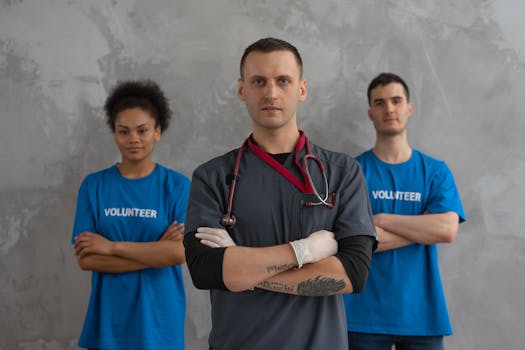You could do a foundation degree or degree in a subject like:
- education
- sociology
- youth work
- community development
Entry requirements
You'll usually need:
- 2 to 3 A levels, or equivalent, for a degree
A Volunteer Coordinator is responsible for recruiting, training, and supporting volunteers in a range of organisations, such as charities, hospitals, and community groups. Their main tasks include organising volunteer programmes, matching volunteers to suitable roles, maintaining records, and ensuring that volunteers have a positive and rewarding experience. They often act as the main point of contact between volunteers and the organisation, helping with conflict resolution and providing ongoing support. This role requires excellent communication, organisational, and people skills. It is suited to individuals who are passionate about helping others and making a difference in their community.

Volunteer Coordinators in the UK typically earn between £20,000 and £30,000 per year, depending on experience and location.
There are around 3,500 to 5,000 Volunteer Coordinator positions advertised each year in the UK, with roles found in charities, NHS trusts, and local councils.
Most Volunteer Coordinators work between 35 and 40 hours per week, but some roles require evening or weekend work to meet with volunteers.

Organises and manages volunteering opportunities specifically for young people, often within schools or youth organisations.

Coordinates volunteering activities for employees within a business, focusing on projects that benefit the community and align with company values.
Oversees and supports volunteers working at specific events such as charity runs, festivals, or awareness days, ensuring smooth operations and a positive experience for volunteers.
Start by volunteering with local charities or community groups to gain first-hand experience in the sector.
Look for opportunities with charities, food banks, animal shelters, or community events. This will help you understand how volunteer programmes operate and develop your communication and teamwork skills. You can search on platforms such as Do-it.org or contact local organisations directly.
Take on more responsibility within your volunteering roles by helping organise events or coordinate small groups.
Ask your volunteer supervisor if you can assist with scheduling, record keeping, or helping new volunteers settle in. This hands-on experience is highly relevant for future Volunteer Coordinator roles and will help you demonstrate your organisational abilities.
Complete short courses or workshops on volunteer management, safeguarding, or charity operations.
Look for courses offered by the National Council for Voluntary Organisations (NCVO), local councils, or adult education centres. These courses can provide you with practical knowledge on recruiting, supporting, and retaining volunteers, as well as legal and ethical considerations.
Pursue a relevant diploma or degree, such as in Social Sciences, Community Development, or Human Resources.
While not always required, some employers may prefer candidates with formal education. Relevant courses can be found at colleges and universities across the UK. Apprenticeships in charity or community work are also available.
Highlight your volunteering and organisational experience, as well as any relevant qualifications.
Tailor your CV and cover letter to each organisation, emphasising your understanding of volunteer management and your passion for supporting communities. Include specific examples of projects or teams you have helped coordinate.
Look for Volunteer Coordinator vacancies with charities, local authorities, or non-profit organisations.
Use job boards such as CharityJob, Guardian Jobs, and local council websites. Be sure to network with people in the voluntary sector, attend events, and join relevant online groups to hear about new opportunities.
Explore relevant apprenticeships that can help you kickstart your career in Volunteer Coordinator. Apprenticeships offer hands-on experience and training while earning a wage.
This page showcases various career options and the pathways to reach them. Each career listed here shares transferable skills and knowledge, making it easier for individuals to transition between them.
Your current career is highlighted to help you see how it fits into the broader landscape of potential career choices. By clicking on any career, you can learn more about it, including the training and education required to pursue it.
Remember, progressing in your career often involves further learning and training. This page provides insights into future career options as well as those that can lead up to your current one.
These career progression decisions are informed by comparing the skills and knowledge needed for different occupations, along with data on how people move between them. Explore the possibilities and discover the exciting journey ahead in your career!
A Volunteer Coordinator and a Community education co-ordinator both organise, manage, and facilitate activities aimed at engaging and supporting the community. Both roles require strong communication skills, organisation, and an understanding of community needs to effectively coordinate volunteers or educational programmes.
You can get into this job through:
You could do a foundation degree or degree in a subject like:
You'll usually need:
You could do a college course which might be useful when applying for a trainee job. Courses include:
Entry requirements for these courses vary.
You could start by doing a Level 3 Advanced Apprenticeship as a:
These apprenticeships can take around 1 year and 6 months to complete.
You'll usually need:
You could become a community education co-ordinator though volunteering.
Volunteering is a good way to get practical experience, meet new people and develop your network of contacts. This might help you when looking for a job in community education or development.
You can find volunteering opportunities through The National Council for Voluntary Organisations (NCVO) and Do It.
You could apply directly for community education co-ordinator jobs.
You'll need paid or voluntary experience of working in the community such as in:
You'll also find it helpful to have experience of working with disadvantaged or vulnerable groups.
You can find your local council to get more details about working in your community or learn about working in community education through Locality.
Explore other careers or use our AI to discover personalised paths based on your interests.
Address
Developing Experts Limited
Exchange Street Buildings
35-37 Exchange Street
Norwich
NR2 1DP
UK
Phone
01603 273515
Email
[email protected]
Copyright 2026 Developing Experts, All rights reserved.
Unlock expert-designed lessons, resources, and assessments tailored for educators. No credit card required.
Claim Your Free Trial →